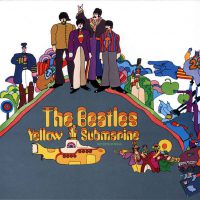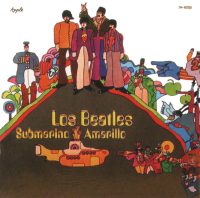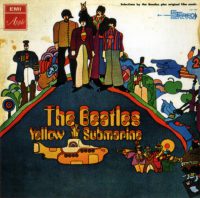Cover artwork
The front cover of the Yellow Submarine album features a cartoon of The Beatles, which had previously featured on posters for the film. The UK version of the album had the words “NOTHING IS REAL” in small letters below the title.Furthermore, the tracklisting for the US LP listed six tracks on side two: ‘Sea Of Time’ and ‘Sea Of Holes’ were combined into one track, listed as ‘Medley: Sea of Time & Sea of Holes’.
UK sleeve notes
Somewhat oddly, the back cover of the UK edition contained a review of the White Album, written by Tony Palmer of the Observer newspaper. It was preceded by a short introduction by Apple’s press officer Derek Taylor.
My name is Derek but that is what mother called me so it’s no big thing, except that it is my name and I would like to say I was asked to write the notes for Yellow Submarine. Now Derek Taylor used to be the Beatles press agent and then, in America he became the former Beatles press agent (having left them) and now Derek Taylor is the press agent for the Beatles again so when he was asked to write the notes for Yellow Submarine he decided that not only had he nothing new to say about the Beatles whom he adores too much to apply any critical reasoning, and by whom he is paid too much to feel completely free, and also he couldn’t be bothered, and also he wanted the people who bought the Yellow Submarine album to buy and enjoy the really wonderful “The Beatles” album out in the month of November ’68 so here and now, unbought, unsolicited, unexpurgated, unattached, pure and unmeasurably favourable review of “The Beatles” (the new Apple/EMI album) from the London Observer by Tony Palmer, a journalist and film-maker of some special distinction.The Beatles’ bull’s-eye
If there is still any doubt that Lennon and McCartney are the greatest song writers since Schubert, then next Friday – with the publication of the new Beatles double LP – should surely see the last vestiges of cultural snobbery and bourgeois prejudice swept away in a deluge of joyful music making, which only the ignorant will not hear and only the deaf will not acknowledge. Called simply The Beatles (PMC 7067/8), it’s wrapped in a plain white cover which is adorned only by the songs titles and those four faces, faces which for some still represent the menace of long-haired youth, for others the great hope of a cultural renaissance and for others the desperate, apparently endless struggle against cynical so-called betters.
In the Beatles’ eyes, as in their songs, you can see the fragile fragmentary mirror of society which sponsored them, which interprets and makes demands of them, and which punishes them when they do what others reckon to be evil; Paul, ever-hopeful, wistful; Ringo, every mother’s son; George, local lad made good; John, withdrawn, sad, but with a fierce intelligence clearly undimmed by all that organized morality can throw at him. There are heroes for all of us, and better than we deserve.
It’s not as if the Beatles ever seek such adulation. The extra-ordinary quality of the 30 new songs is one of simple happiness. The lyrics overflow with a sparkling radiance and sense of fun that it is impossible to resist. Almost every track is a send-up of a send-up of a send-up, rollicking, reckless, gentle, magical. The subject matter ranges from piggies (‘Have you seen the bigger piggies/In their starched white shirts’), to Bungalow Bill of Saturday morning film-show fame (‘He went out tiger hunting with his elephant gun/In case of accidents he always took his mom’); from ‘Why don’t we do it in the road’ to ‘‘Savoy Truffle’.’
The skill at orchestration has matured with finite precision. Full orchestra, brass, solo violin, glockenspiel, saxophone, organ, piano, harpsichord, all manner of percussion, flute, sound effects, are used sparingly and thus with deftness.
Electronic gimmickry has been suppressed or ignored in favour of musicianship. References to or quotations from Elvis Presley, Donovan, Little Richard, the Beach Boys, Blind Lemon Jefferson are woven into an aural fabric that has become the Bayeux Tapestry of popular music. It’s all there, if you listen. Lennon sings ‘I told you about strawberry fields’ and ‘I told you about the fool on the hill’ – and now?
The Beatles are competent rather than virtuoso instrumentalists – but their ensemble playing is intuitive and astonishing. They bend and twist rhythms and phrases with a unanimous freedom that give their harmonic adventures the frenzy of anticipation and unpredictability. The voice – particularly that of Lennon – is just another instrument, wailing, screeching, mocking, weeping.
There is a quiet determination to be rid of the bogus intellectualization that usually surrounds them and their music. The words are most deliberately simple-minded – one song is just called ‘‘Birthday’’ and includes lines like, ‘Happy birthday to you’; another just goes on repeating ‘Good-night’; another says ‘I’m so tired, I haven’t slept a wink.’ The music is likewise stripped of all but the simplest of harmonies and beat – so what is left is a prolific out-pouring of melody, music-making of unmistakable clarity and foot-tapping beauty.
The sarcasm and bitterness that have always given their music its unease and edginess still bubbles out – ‘‘Lady Madonna’ trying to make ends meet – yeah/Looking through a glass onion.’ The harshness of the imagery is, if anything, even harsher; ‘The eagle pick my eye/The worm he locks my bone.’ Black birds, black clouds, broken wings, lizards, destruction. And, most grotesque of all, there is a terrifying track called ‘‘Revolution 9’,’ which comprises sound effects, overheard gossip, backwards-tapes, janglings from the subconscious memories of a floundering civilization. Cruel, paranoiac, burning, agonized, hopeless, it is given shape by an anonymous bingo voice which just goes repeating ‘Number nine, number nine, number nine’ – until you want to scream.
McCartney’s drifting melancholy overhands the entire proceedings like a purple veil of shadowy optimism – glistening, inaccessible, loving.
At the end, all you do is stand and applaud. Whatever your taste in popular music, you will find it satisfied here. If you think that pop music is Engelbert Humperdinck, then the Beatles have done it better – without sentimentality, but with passion; if you think that pop is just rock ‘n’ roll, then the Beatles have done it better – but infinitely more vengefully’ if you think that pop is mind-blowing noise, then the Beatles have done it better – on distant shores of the imagination that others have not even sighted.
This record took them five months to make and in case you think that’s slow going, just consider that its completion they’ve written another 15 songs. Not even Schubert wrote at that speed.
US sleeve notes
For the American version, the Yellow Submarine album contained a fictional biography of Sgt Pepper’s Lonely Hearts Club Band, credited to Dan Davis.
Somewhere during the hours between the years 700 and 750 (anno Domini), a brother from the Northumbrian monastery wrote a youthful thane of King Hygelac (King of the Geats) named Beowulf… a hero. A super-hero who arrived from far by sea to rescue Heorot… a feasting hall built by a benevolent old king called Hrothgar… a feasting hall that exuded the pleasures of food and music and perpetual celebration and all that was raison d’être… a feasting hall which for years had been ravaged by the villainy of an evil spirit named Grendel. Having already proven his metal as a good-guy combatant par excellence (by the conquering of a picturesque sea monster and a victory over Breca in a swimming match), Beowulf goes forth to rid the once beautiful Northumbrian landscape of destructive Grendel… a demon who indeed perishes when his arm is delicately dislodged from its socket by Mr. Wulf. The kingdom is saved (albeit after disposing of Grendel’s mother who took unkindly to the action) and Heorot restored with the pleasures of food and music and perpetual celebration and colorful beauty… a restoration which permits bigger and better glorias to be raised to the local gods addressed as Wryds.Some 465 years later (1215), an English king named King John signed a Magna Carta at a roost called Runnymede… an act of prodded royalty which liberated barons and bumpkins to roust with a greater degree of carefreedom.
Some 561 years later than that (1776), a Virginia gent named Jefferson quilled a Declaration of Independence in, of all places, Philadelphia and shipped it to a king called King George which hypothetically rid a small group of new-world colonies from crimson-flocked enforcers from a faraway land… taxations without representations vanished and the colonies flourished freely under a hero named after the colonies’ capital, Washington. (Ruffled feathers on both sides of the sea have since been plucked.)
And in 1968 – some 1,218 years anno Beo (A.B); 753 years anno Magna (A.M.); 192 years anno Declaration (A.D.) – bad people (Blue Meanies) still force their wills on good people (Pepperlanders) and demolish the human and physical landscape of beautiful pleasure domes (Pepperland). And Agnes – the inquisitive baby sitter next door in California, United States of America – will be pleased to know that there are still heros around of the calibres of Messrs. Wulf, John and Jefferson… there’s John, Paul, George and Ringo and their attending Lonely Hearts Club Band who sail from one place (Liverpool) at the invitation of a benevolent but old leader of another place (the Lord Mayor of Pepperland) to rescue the pleasures of food and music and perpetual celebration and colorful beauty from the villainous hands of less-than-beautiful people (Blue Meanies) who act under the supreme guidance of the most evil spirit (Chief Blue Meanie). The Beatles come by sea (through the Seas of Monsters, Time, Music, Science, Consumer Products, Nowhere, Green Phrenology and Holes – each puddle supporting a lively cast of characters) in a YELLOW SUBMARINE captained by Old Fred (also leader of Sgt. PLHCB) where they prove their heroic metal by outwitting a sea monster (Vacuum Man) and out-swimming competition (School of Whales) even before they reach the shores of the besieged undersea kingdom of Pepperland. Once arrived at target P., they triumph over the Chief Blue Meanie’s primary evil-tempered henchmen (par exemple: the lanky Apple Bonker who assaults his prey with Baldwin apples; the corpulent Hidden Persuader with a penchant for underhanded inscrupulence; the abdominal Snapping Turtle Turk who chomps at the slightest bit; the belligerent Butterfly Stompers who perform tasks that any evil butterfly stompers worth their soul would perform with supreme acuity). The good guys win… the hero-Beatles triumph once again and restore the pleasures of color and music and all that’s beautiful… a restoration which permits bigger and better glorias to be sung to the reigning god of Pepperland addressed as Love.





“The dregs of their inventory” says George Martin!
It was his instrumental drivel that devalues the “Album”!
Martin never took George Harrison seriously! “It’s All Too Much” is, along side “Tomorrow Never Knows”, “Rain”, and “She Said She Said” the greatest piece of Psychedelia The Beatles ever recorded!
Like “Magical Mystery Tour”, this Beatles “Album” should have been released as an EP! like they originally planned!
What I never understood is why was the movie released in August, 1968 and the “Album” released so much later?
Yes those 2 songs are the best of the entire opus. Harrison was often sidelined by the 2 giants of song writing. In a way it can be understood. Musicians have big egos ? and yet he wrote My Sweet Lord admittedly after they called it quits but Only A Northern Song and It’s All Too Much are to my ears clearly the best cuts here and not the 2 new L/Mc items
As for the frustrated classical composer his input here can be at best described as adequate/just fit for the job he is no Debussy ? but hey at least he managed to smuggle some of his efforts onto a recording of the most lauded greatest band of the 20th Century so he scored; yes he scored ….
I really love Harrison’s songs on this album, far better than I liked all of his Indian songs elsewhere or Blue Jay Way. IMHO, George carried this album and It’s all too much is my favorite psychedelic style Beatles song and love the dissonance of It’s only a northern song.
It’s All Too Much is a great little song. It was years before I found out that John Lennon played all the guitar and Harrison played organ throughout. I never cared much for Only A Northern Song. Initially recorded for Sgt. Pepper. George Martin told Harrison the song was weak and not up to snuff for Sgt. Pepper, so Harrison came back with a new song, Within You Without You. A far superior tune with wonderful lyrics. Not everybody cares for Indian music, but I always found it comforting.